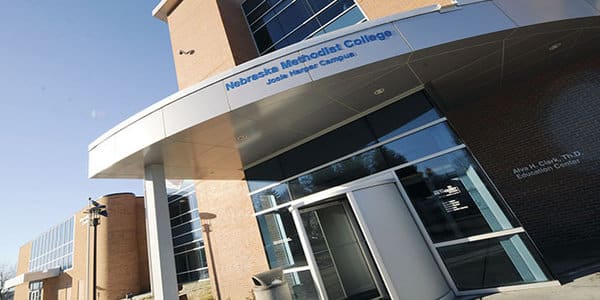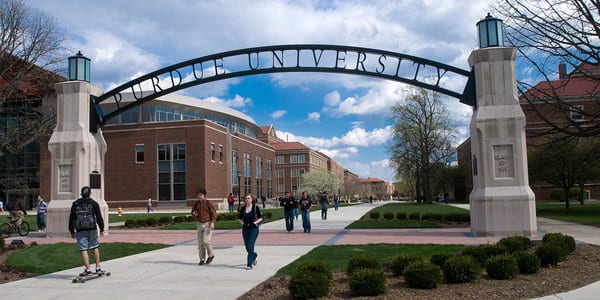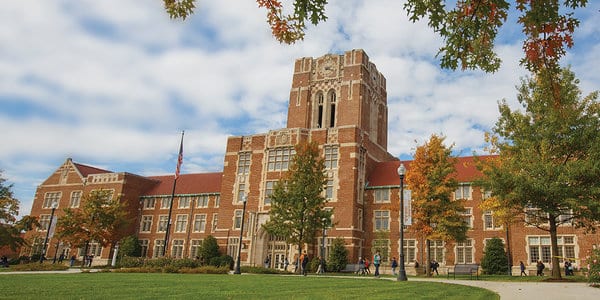Best DNP Programs in 2024 (Online & On-Campus)
Best DNP Programs in 2024 (Online & On-Campus)
 The demand for nurses is growing, and the demand for competent and highly-trained nurses is even higher. If you have the means, now might be a good time to consider attending one of the best DNP programs.
The demand for nurses is growing, and the demand for competent and highly-trained nurses is even higher. If you have the means, now might be a good time to consider attending one of the best DNP programs.
Unlike a Ph.D., a DNP (Doctor of Nursing Practice) is a practice doctorate that will allow you to advance in the medical field by practicing research clinically. It’s the highest degree in nursing that someone can receive. Although this degree can take three to five years to complete and is incredibly challenging, DNP nurses earn a higher pay, have advanced leadership roles, and have the skills to have a positive impact on your community.
Featured Online Bachelor's in Psychology Programs
According to the Bureau of Labor Statistics, jobs for nurse practitioners is projected to grow an incredible 31%! Compare that to the national job growth average of 7% and you’re looking at a guaranteed job for the rest of your life. Furthermore, the average DNP nurse’s salary in most states is approximately $150,000 per year. We have provided a list of online DNP programs and on-campus.
The Best DNP Programs in 2024 (Online and On-Campus)
1. Texas Women’s University

Texas Women’s University offers a DNP program for advanced practice nurses wanting to further their education. Classes are offered in a mix of online and in-class work with projects due throughout. Students must have an active RN license to apply.
- In-State Tuition: $2,575
- Out-of-State Tuition: $7,555
2. University of Michigan – Flint

The University of Michigan in Flint prepares students to become highly-skilled nurse practitioners. This university is unique because it allows students with bachelor degrees outside the nursing field to acquire a DNP. This is an online DNP program that can take 3-6 years.
- Tuition: $9,912
3. University of Kansas – Kansas City

The University of Kansas in Kansas City offers a DNP program that includes BSN to DNP and MSN to DNP pathways. Students can choose from seven specialties to enable them to focus on their interests. Students will be trained to qualify for leadership positions in healthcare and educational settings.
- In-State Tuition: $3,927
- Out-of-State Tuition: $10,234
4. South Dakota State University

South Dakota State University offers an excellent DNP program for students who have a BSN or an MSN degree. To be admitted, students must have an active RN license and at least 1500 hours of experience with proof provided by an employer. Students can choose from four specialties. Classes are mainly face-to-face and some courses are hybrid.
- In-State Tuition: $7,155
- Out-of-State Tuition: $10,386
5. University of Missouri

The University of Missouri offers one of the best online DNP programs with five concentrations to specialize in. Online students only have to pay in-state tuition no matter where they are. The DNP program online can be obtained between two and six years depending on past education and whether you’re studying full-time or part-time.
- In-State Tuition: $11,008
- Out-of-State Tuition: $11,008
6. Nebraska Methodist College

Nebraska Methodist College offers four different pathways to obtain a DNP: two BSN to DNP programs online, APRN to DNP, and MS to DNP. Courses can be taken completely online and are comprised of 5-week blocks. The electives can be chosen from rural, educational, or community health planning.
- Tuition: $13,632
7. University of South Florida

The University of South Florida offers a BSN to DNP and an MSN to DNP degrees. Students wanting to apply must have a BSN degree, a 3.0 GPA or higher of past coursework, a current RN license, and at least a 3-credit statistics class with a B or higher.
- In-State Tuition: $6,410
- Out-of-State Tuition: $17,324
8. University of Missouri – Kansas City

The University of Missouri in Kansas City offers both BSN to DNP and MSN to DNP programs. Classes are taught in a hybrid format, and residency is required every summer. While coursework is mainly online, scheduled chat times are required, typically taking place on Thursdays and Fridays planned well in advance.
- In-State Tuition: $6,535
- Out-of-State Tuition: $17,575
9. University of Texas Arlington

The University of Texas in Arlington offers a DNP to students who have an MSN degree. Students will be taught how to integrate evidence-based research and theory into every day practice to improve the healthcare system. Students with a 3.5 GPA or higher can be granted unconditional admittance.
- In-State Tuition: $7,350
- Out-of-State Tuition: $20,654
10. Georgia Southern University

Georgia Southern University offers an eight-semester DNP program that is flexible for busy students with full-time careers. The program is offered fully online except for a week-long intensive that is required annually at the campus every semester.
- In-State Tuition: $7,422
- Out-of-State Tuition: $20,904
11. University of Maryland – Baltimore

The University of Maryland in Baltimore is designed to prepare elite students to become leaders in the healthcare industry. To apply, students must have a BSN undergraduate and a 3.0 GPA in their past coursework.
- In-State-Tuition: $8204
- Out-of-State Tuition: $21,432
12. Florida Atlantic University

Florida Atlantic University offers a DNP program that trains students to improve health outcomes for individuals and communities. The BSN to DNP degree can only be taken full-time and the MSN to DNP degree can only be taken part-time. A limited number of applicants will be accepted.
- In-State Tuition: $6,039
- Out-of-State Tuition: $21,595
13. New Mexico State University

New Mexico State University offers two pathways to their DNP program and offers two specialties for students who haven’t chosen one. Due to demand, students applying to the BSN to DNP program can only study full-time while MSN students have the opportunity to study part-time.
- In-State Tuition: $7,122
- Out-of-State Tuition: $22,701
14. University of Buffalo

The University of Buffalo offers BSN to DNP and MSN to DNP programs. To apply, students must have a BSN, a 3.0 GPA, an active RN license, and at least one full year of nursing experience. Students will be taught critical thinking and independent decision making in clinical practice, leadership, consultation, and education.
- In-State Tuition: $6,770
- Out-of-State Tuition: $23,270
15. University of Colorado – Colorado Springs

The University of Colorado in Colorado Springs offers both BSN to DNP and MSN to DNP degrees. Both tracks can be taken completely online without campus visits and require a BSN and a 3.3 GPA to be admitted.
- Degree programs:
- Online BSN to DNP programs
- In-State Tuition: $10,201
- Out-of-State Tuition: $24,181
16. University of Nebraska

The University of Nebraska has a DNP program for students seeking a terminal degree. Their focus is to advance clinical expertise and improve quality in the healthcare field throughout the country. Students obtaining their DNP with only a bachelor degree will choose a clinical specialty.
- In-State Tuition: $8,901
- Out-of-State Tuition: $24,204
17. Washington State University

Washington State University offers a DNP program for licensed RNs with a BSN or MSN degree. The school offers three specialty track options and classes are delivered in a hybrid format. Students can study part-time or full-time and the degree will take three to five years to complete.
- In-State Tuition: $10,078
- Out-of-State Tuition: $24,504
18. Maryville University

Maryville University offers a DNP for ambitious students who want to increase their education and elevate their goals. The program can be taken completely online with no GMAT or GRE required for admission. The degree can be obtained between 20 and 36 months.
- Tuition: $25,558
19. University of Cincinnati

The University of Cincinnati offers BSN to DNP and MSN to DNP programs. They offer eight different specialties to choose from and offer information sessions for prospective students to attend for more information.
- In-State Tuition: $11,000
- Out-of-State Tuition: $26,334
20. University of Illinois – Chicago

The University of Illinois at Chicago offers a DNP program that provides students a wide variety of opportunities to broaden their knowledge and improve their existing skills. Graduates will be taught to synthesize practice, research, and theory to improve patient care.
- In-State Tuition: $13,704
- Out-of-State Tuition: $26,560
21. University of Minnesota

The University of Minnesota offers two DNP programs that are mostly online with a couple of days required to attend in person. Students get to choose from a whopping eleven concentrations to specialize in with their degree.
- In-State Tuition: $14,417
- Out-of-State Tuition: $26,603
22. University of Oklahoma

The University of Oklahoma offers a DNP degree for RNs to want to advance in their career. To apply, students must have an RN license, an MS in Nursing, and a 3.0 GPA in past coursework. Students are able to study part-time or full-time to accommodate their schedules.
- In-State Tuition: $11,538
- Out-of-State Tuition: $26,919
23. University of Kentucky

The University of Kentucky offers a DNP program that was the very first in the U.S. They offer both BSN to DNP and MSN to DNP and are known for their work in specialties. The program can be completed in three years if taken full-time with courses delivered in a mix of online and in-person.
- In-State Tuition: $11,772
- Out-of-State Tuition: $27,856
24. University of Utah

The University of Utah offers one of the best DNP programs with six specialties available, five of which are offered online. The program prepares nurses for the highest level of practice and graduates will be able to combine research into practice to improve patient care.
- In-State Tuition: $8,824
- Out-of-State Tuition: 28,067
25. University of Alabama

The University of Alabama offers an online DNP program that opens every fall. Students in the program are required to find their own clinical site and clinical advisor for practice and work that goes alongside coursework.
- In-State Tuition: $10,780
- Out-of-State Tuition: $28,100
26. University of Florida

The University of Florida offers both a BSN to DNP or an MSN to DNP for all types of students. The degree provides students with advanced practical skills to use in the healthcare environment comparable to other healthcare providers. Florida offers online classes and student-scheduled clinical hours for busy student schedules.
- In-State Tuition: $6,381
- Out-of-State Tuition: $28,658
27. Purdue University

Purdue University offers two pathways to reach a DNP to accommodate all kinds of students. Students will receive 1,000 hours of clinical experience and students with master’s degrees can transfer up to 40 credits from an accredited school.
- In-State Tuition: $9,992
- Out-of-State Tuition: $28,794
28. Gardner-Webb University

Gardner-Webb University offers a DNP program only for students with an MS in Nursing. Students will be taught to synthesize research and theory into clinical practice while gaining at least 400 clinical practice hours. Students must have a 3.2 GPA and RN license to apply.
- Tuition: $29,420
29. Rutgers University Newark

Rutgers University in Newark offers a DNP program that can be hybrid, full-time, or part-time. Rutgers is unique in the fact that students will be provided clinical practice experience in every specialty the school offers instead of having to pick a concentration.
- In-State Tuition: $11,821
- Out-of-State Tuition: $29,480
30. Ohio State University

Ohio State University offers a DNP program for students who want to lead in innovative and transformational healthcare environments. All coursework can be done online which allows busy professionals to maintain their working careers.
- In-State Tuition: $10,591
- Out-of-State Tuition: $29,695
31. University of Iowa

The University of Iowa offers BSN to DNP, MSN to DNP, and Post Grad Certificate programs. Students who haven’t chosen a specialty or are looking to change specialties can choose from eight concentrations.
- In-State Tuition: $8,964
- Out-of-State Tuition: $30,608
32. University of Pittsburgh

The University of Pittsburgh offers five different DNP programs: clinical nurse specialist, health systems executive leadership, nurse anesthetist, midwife, or a nurse practitioner with six different concentrations to pick from. Both MSN to DNP and BSN to DNP programs are available to benefit students from differing backgrounds.
- In-State Tuition: $19,080
- Out-of-State Tuition: $30,642
33. University of Tennessee

The University of Tennessee offers a DNP program that focuses on leadership and developing skills in the workplace. Four concentrations are available to choose from. To be admitted, students must have three letters of reference as well as follow other application requirements.
- In-State Tuition: $12,970
- Out-of-State Tuition: $31,160
34. University of Colorado – Denver

The University of Colorado in Denver was one of the first colleges in the rocky mountains to have a DNP program. Fourteen states qualify for in-state admission. However, there is no BSN to DNP degree available. The School expects you to already hold an MS in Nursing with a specialty to be admitted.
- In-State Tuition: $11,019
- Out-of-State Tuition: $31,209
35. University of Texas – Galveston

The University of Texas at Galveston offers a DNP program comprised of 42 credits. The program is taught mostly online with trips to campus for 2-3 days per semester. Their mission is to prepare advanced nurses to lead in the medical field by improving practice in quality healthcare.
- In-State Tuition: $17,184
- Out-of-State Tuition: $31,711
36. University of Connecticut

The University of Connecticut offers a DNP program that was the first DNP program in Connecticut. The program has two points of entry for BSN and MSN students and students will be able to choose a specialty in their area of interest.
- In-State Tuition: $925/credit
- Out-of-State Tuition: $925/credit
37. Bradley University

Bradley University offers one of the best DNP program with rigorous coursework, qualified professors and quality curriculum online. Bradley prides itself on its flexibility with part-time and online options for working professionals.
- Tuition: $32,930
38. University of Massachusetts Amherst

The University of Massachusetts Amherst offers an online DNP program and has since been recognized for its excellent online learning programs. The program is completely online with clinical internships taken in the area of your choice. Students must complete 30-80 credits depending on the specialization area. DNP specialization areas include:
- BS-DNP: Public Health Nurse Leader, Family Nurse Practitioner, Psychiatric Mental Health Nurse Practitioner, Adult-Gerontology Primary Care Nurse Practitioner
They also offer an MS-DNP pathway.
- Tuition (in-state & out-of-state): $750/credit+$47 registration fee per semester
39. George Mason University

George Mason University offers a DNP degree with four different concentrations to choose from. To be admitted, students must maintain an RN license. Students will be given the opportunity to have 1,000 hours of clinical practice, and they will complete two practice inquiry projects (PIP).
- In-State Tuition: $11,924
- Out-of-State Tuition: $34,370
40. University of North Carolina – Chapel Hill

The University of North Carolina at Chapel Hill offers both a BSN to DNP and an MSN to DNP program. Students have the opportunity to choose from five different specialties and the programs are flexible for students wanting to take part-time or full-time studies.
- In-State Tuition: $9,005
- Out-of-State Tuition: $34,588
41. University of Arizona

The University of Arizona offers a DNP degree completely online. The program is offered in a part-time or full-time program that takes between 2.5 and 3.5 years. Students will be taught to provide high-quality care to students while assessing how to enhance healthcare through published evidence in the field.
- In-State Tuition: $11,877
- Out-of-State Tuition: $35,307
- They also offer one of the best online MSN Programs in Arizona
42. University of Washington

The University of Washington doesn’t offer much information on their DNP program, but they offer information sessions for students interested in applying as well as essay application information for students looking to apply.
- In-State Tuition: $10,974
- Out-of-State Tuition: $35,538
43. University of Texas

The University of Texas offers a DNP program with 45 credit hours in philosophy, science, policy, epidemiology, management, and more. The degree is taught in hybrid form with classes held on campus twice a month with online assignments throughout.
- In-State Tuition: $10,136
- Out-of-State Tuition: $35,766
44. Gonzaga University

Gonzaga University offers DNP programs for both post-BSN and post-MSN graduates. This program is perfect for recent graduates and students can expect one-on-one care in their education. If you’re taking the post-BSN to DNP program, the program can take approximately seven years to compete. Classes can be taken online with up to fifteen credits available to transfer.
- Tuition: $38,390
45. Marquette University

Marquette University offers both a BSN to DNP online and an MSN to DNP program with six specialties to choose from. Courses can be in person, hybrid, or online. Students wishing to apply must have a BSN degree, a 3.0 GPA, official transcripts, three letters of recommendation, and a current Wisconsin RN license.
- Tuition: $39,900
46. Loyola University

Loyola University offers a DNP program designed to develop skills and knowledge into nurses. Courses are taken primarily online, but students need to come to campus for 2-3 days for seminars and presentations.
- In-State Tuition: $39,942
- Out-of-State Tuition: $39,942
47. Vanderbilt University

Vanderbilt University‘s DNP program is designed to prepare students to incorporate evidence-based research into the complex healthcare system. Vanderbilt offers three different pathways in their DNP program to accommodate all kinds of students.
- Tuition: $43,838
48. University of Virginia

The University of Virginia offers both a post BSN program and MSN program to obtain a DNP. Both full and part-time options are available and students will obtain more than 1,000 practicum hours. If you already have an MSN degree, the DNP only requires 40 credit hours.
- In-State Tuition: $16,781
- Out-of-State Tuition: $46,634
49. University of Michigan – Ann Arbor

The University of Michigan at Ann Arbor offers both post-baccalaureate and post-master DNP programs, and students do not have to have work experience as an RN to be admitted. To apply, students must have a 3.0 GPA or higher in past coursework.
- In-State Tuition: $14,826
- Out-of-State Tuition: $47,476
50. University of San Diego

The University of San Diego offers both BSN to DNP and MSN to DNP programs. The BSN to DNP program can be completed in three years with full-time study, although part-time study is also available. The MSN to DNP program is approximately 34 credits.
- Tuition: $47,708
51. Emory University

Emory University offers both a BSN to DNP and an MSN to DNP program. Applicants will need an average GPA of 3.5, a resume, and two professional recommendations. Students can choose concentrations to specialize in the nursing practice of their choice.
- Tuition: $49,392
52. Yale University

Yale University offers a DNP program that combines online coursework with in-class lectures to give students the best education possible. It’s perfect for nurses who have major professional experience previous work commitments.
- Tuition: $49,550
53. New York University

New York University offers three different pathways for their DNP program. Students will be trained to translate evidence-based research into daily clinical practice to improve the healthcare industry and create a positive impact on the world around them.
- Tuition: $50,464
54. Rush University

Rush University offers a DNP program that will train graduates to be leaders with a focus on clinical excellence as well as improving healthcare through published evidence. the degree takes approximately 2.5-3.5 years to complete and offers extensive career opportunities all over the country.
- Tuition: $50,790
55. Drexel University

Drexel University offers an online DNP program that is designed to equip students to implement science from researchers into daily clinical practice. 500 clinical hours are required, but you only need to be present at the campus for orientation, Global Immersion during your second year, and to present your DNP project upon graduation.
- Tuition: $50,874
56. John Hopkins University

John Hopkins University offers both an advanced and an executive track for the DNP program. Students who obtain this degree will be trained to translate knowledge into practice. The program is offered in-class and online for ultimate student flexibility.
- Tuition: $52,670
57. George Washington University

George Washington University offers a DNP program mostly online with some attendance required for testing. This practice-focused doctorate typically takes three years to complete with several options for different fields of study.
- Tuition: $53,518
58. Duke University

Duke University offers one of the best DNP programs which allows you to pursue your degree without leaving your job. The program will teach students how to assess published evidence, improve systems of care to patients, and make changes to enhance the quality of care in the health field.
- Tuition: $53,744
59. Columbia University

Columbia University offers BSN to DNP and MSN to DNP programs. Whereas some universities offer their degrees mostly online, Columbia University requires students from both programs to complete two semesters in residency in which students will master the Columbia DNP competencies in comprehensive care.
- Tuition: $57,208
60. Medical University of South Carolina

The Medical University of South Carolina offers an online DNP program that focuses on the contemporary aspects of clinical practice and leadership. Upon completion, graduates will have obtained an MSN and a DNP, even if they only had a BSN upon application.
- In-State Tuition: $33,888
- Out-of-State Tuition: $60,750
- Awards A Master of Science in Nursing (MSN) degree
61. Oregon Health and Science University

Oregon Health and Science University has three pathways to their DNP program. Students can choose from five concentrations to specialize in alongside learning how to expand their practice and knowledge in depth and breadth.
- In-State Tuition: $41,596
- Out-of-State Tuition: $62,700
Ranking Methodology
All schools have been ranked by estimated tuition. Totals come from estimates involving the number of credit hours required and each school’s per-credit-hour cost. Wherever possible, tuition has been reported without the cost of room and board, which is not applicable to many students. State schools have been reported by their out-of-state tuition fees. All numbers are estimates; please contact each school directly for additional information about tuition, fees, and scholarships. See our methodology page for more detail.
Do you see your school on our list? Would you like to make an edit to the existing information? Please contact us here to let us know.
Nursing Articles
- ¿Cómo obtengo un título de fisioterapia en los EE. UU.?
- 10 Best Nursing Schools in Phoenix in 2024 (On-Campus & Online)
- 5 Reasons Why You Should Become a CNA
- 6 Nursing Scholarships For All Students
- About Us
- Accelerated Nursing Programs In Utah: Everything You Need To Know
- ADN vs BSN – What You Need to Know
- Advance Your Nursing Career Today!
- Amazing Texas College Responses to COVID-19
- APRN Salary Trends: What To Expect In The Coming Years
- Are You Ready to Make a Difference in People’s Lives—Without Waiting Years to Get Started?
- Average Nurse Salary
- Becoming An HIV & AIDS Nurse
- Best 16 accelerated nursing programs in ny in 2024
- Best 22 LPN Programs in MA in 2024
- Best Accelerated BSN Programs in 2024 (Online & On-Campus)
- Best Accelerated Nursing Programs in 2024 (Online & On-Campus)
- Best Accelerated Nursing Programs in 2024: Explore Options Today
- Best Accelerated Nursing Programs in Florida in 2024 (Online & On-Campus)
- Best Accelerated Nursing Programs in Massachusetts in 2024 (Online & On-Campus)
- Best ADN to MSN Programs in 2024 (Online & On-Campus)
- Best Associate of Science in Nursing Degrees in 2024 (Online & On-Campus)
- Best BSN Degree Programs in 2024 (Online & On-Campus)
- Best BSN Nursing Programs in Chicago in 2024 (Online & On-Campus)
- Best BSN Nursing Programs in Georgia in 2024 (Online & On-Campus)
- Best BSN Programs in Arizona in 2024 (Online & On-Campus)
- Best BSN Programs in California in 2024 (Online & On-Campus)
- Best BSN Programs in Colorado in 2024 (On-Campus & Online)
- Best BSN Programs in Connecticut in 2024 (Online & On-Campus)
- Best BSN Programs in Florida in 2024 (Online & On-Campus)
- Best BSN Programs in GA in 2024 (On-Campus & Online)
- Best BSN Programs in Houston, Texas in 2024 (On-Campus & Online)
- Best BSN Programs in Illinois in 2024 (Online & On-Campus)
- Best BSN Programs in Los Angeles in 2024 (Online & On-Campus)
- Best BSN Programs in Maryland in 2024 (Online & On-Campus)
- Best BSN Programs in Massachusetts in 2024 (Online & On-Campus)
- Best BSN programs in Michigan in 2024 (Online & On-Campus)
- Best BSN Programs in MN in 2024 (Online & On-Campus)
- Best BSN Programs in New Jersey (NJ) in 2024 (Online & On-Campus)
- Best BSN Programs in New York in 2024 (Online & On-Campus)
- Best BSN Programs in North Carolina in 2024 (Online & On-Campus)
- Best BSN Programs in Ohio in 2024 (Online & On-Campus)
- Best BSN Programs in Oklahoma in 2024 (Online & On-Campus)
- Best BSN Programs in Oregon in 2024 (On-Campus & Online)
- Best BSN Programs in PA in 2024 (Online & On-Campus)
- Best BSN Programs in San Antonio in 2024 (Online & On-Campus)
- Best BSN Programs in San Diego in 2024 (Online & On-Campus)
- Best BSN Programs in Texas in 2024 (Online & On-Campus)
- Best BSN Programs in Utah in 2024 (Online & On-Campus)
- Best BSN Programs in Virginia in 2024 (Online & On-Campus)
- Best BSN Programs in Washington in 2024 (Online & On-Campus)
- Best BSN to DNP Programs in 2024 (Online & On-Campus)
- Best CNA Classes
- Best CNA Programs in the U.S. in 2024 (Online & On-Campus)
- Best Community College Nursing Programs in 2024 (Online & On-Campus)
- Best CRNA Schools in 2024 (Online & On-Campus)
- Best CRNA Schools in Florida in 2024 (Online & On-Campus)
- Best Direct Entry MSN Programs in 2024 (Online & On-Campus)
- Best DNP Degree Programs in 2024 (Online & On-Campus)
- Best DNP Programs in 2024 (Online & On-Campus)
- Best FNP Programs in 2024 (Online & On-Campus)
- Best Forensic Nursing Programs in 2024 (Online & On-Campus)
- Best Gifts for Nurses
- Best Healthcare Administration Programs in 2024 (Online & On-Campus)
- Best LPN Programs in 2024 (Online & On-Campus)
- Best LPN Programs in Connecticut in 2024 (Online & On-Campus)
- Best LPN to BSN Programs in 2024 (Online & On-Campus)
- Best LPN to RN Programs in 2024 (Online & On-Campus)
- Best LPN/LVN to BSN Programs in 2024 (Online & On-Campus)
- Best LVN Programs in 2024 (Online & On-Campus)
- Best Masters Degree in Nursing Programs in 2024 (Online & On-Campus)
- Best Medical Assistant Programs in 2024 (Online & On-Campus)
- Best Medical Billing Schools
- Best MSN Degree Programs in 2024 (Online & On-Campus)
- Best MSN Programs in 2024 (Online & On-Campus)
- Best Neonatal Nurse Practitioner Programs in 2024 (On-Campus & Online)
- Best Nurse Practitioner Programs in 2024 (Online & On-Campus)
- Best Nurse Practitioner Programs in 2024: Explore Options Today
- Best Nursing Careers: 50 Different Types of Nurses
- Best Nursing Degree Programs in 2024 (Online & On-Campus)
- Best Nursing Informatics Programs in 2024 (Online & On-Campus)
- Best Nursing Programs in 2024 (Online & On-Campus)
- Best Nursing Programs in Athens, Georgia in 2024 (Online & On-Campus)
- Best Nursing Programs in Indianapolis in 2024 (On-Campus & Online)
- Best Nursing School in Broward in 2024
- Best Nursing School in Fort Lauderdale in 2024 (On-Campus or Online)
- Best Nursing Schools in 2024: Explore Your Options Today
- Best Nursing Schools in Alabama in 2024 (Online & On-Campus)
- Best Nursing Schools in Alaska in 2024 (On-Campus & Online)
- Best Nursing Schools in Albany, NY in 2024 (Online & On-Campus)
- Best Nursing Schools in Albuquerque, NM in 2024 (Online & On-Campus)
- Best Nursing Schools in Arizona in 2024 (Online & On-Campus)
- Best Nursing Schools in Arkansas in 2024 (On-Campus & Online)
- Best Nursing Schools in Arlington Texas in 2024 (Online & On-Campus)
- Best Nursing Schools in Atlanta in 2024 (On-Campus & Online)
- Best Nursing Schools in Augusta, GA in 2024 (Online & On-Campus)
- Best Nursing Schools in Austin, Texas in 2024 (On-Campus & Online)
- Best Nursing Schools in Baltimore in 2024 (Online & On-Campus)
- Best Nursing Schools in Baton Rouge in 2024 (On-Campus & Online)
- Best Nursing Schools in Birmingham AL in 2024 (Online & On-Campus)
- Best Nursing Schools in Boca Raton in 2024
- Best Nursing Schools in Boston in 2024 (On-Campus & Online)
- Best Nursing Schools in Brooklyn, NY in 2024 (On-Campus & Online)
- Best Nursing Schools in California in 2024 (Online & On-Campus)
- Best Nursing Schools in Central Florida in 2024 (Online & On-Campus)
- Best Nursing Schools in Charlotte, NC in 2024 (On-Campus & Online)
- Best Nursing Schools in Chicago in 2024 (Online & On-Campus)
- Best Nursing Schools in Cincinnati, OH in 2024 (On-Campus & Online)
- Best Nursing Schools in Cleveland, Ohio in 2024 (Online & On-Campus)
- Best Nursing Schools in Colorado in 2024 (Online & On-Campus)
- Best Nursing Schools in Colorado Springs in 2024 (On-Campus & Online)
- Best Nursing Schools in Columbia, SC in 2024 (Online & On-Campus)
- Best Nursing Schools in Columbus Ohio in 2024 (Online & On-Campus)
- Best Nursing Schools in Connecticut in 2024 (Online & On-Campus)
- Best Nursing Schools in D.C. in 2024 (On-Campus & Online)
- Best Nursing Schools in Dallas in 2024 (On-Campus & Online)
- Best Nursing Schools in Dayton, Ohio in 2024 (Online & On-Campus)
- Best Nursing Schools in Delaware in 2024 (Online & On-Campus)
- Best Nursing Schools in Denver Colorado in 2024 (On-Campus & Online)
- Best Nursing Schools in Des Moines in 2024 (Online & On-Campus)
- Best Nursing Schools in El Paso, TX in 2024 (Online & On-Campus)
- Best Nursing Schools in Fayetteville, NC in 2024 (Online & On-Campus)
- Best Nursing Schools in Florida in 2024 (Online & On-Campus)
- Best Nursing Schools in Fort Myers in 2024 (Online & On-Campus)
- Best Nursing Schools in Fort Worth, Texas in 2024 (Online & On-Campus)
- Best Nursing Schools in Georgia in 2024 (Online & On-Campus)
- Best Nursing Schools in Greenville SC in 2024 (Online & On-Campus)
- Best Nursing Schools in Greenville, SC in 2024 (Online & On-Campus)
- Best Nursing Schools in Hawaii in 2024 (On-Campus & Online)
- Best Nursing Schools in Houston in 2024 (Online & On-Campus)
- Best Nursing Schools in Idaho in 2024 (On-Campus & Online)
- Best Nursing Schools in Illinois in 2024 (Online & On-Campus)
- Best Nursing Schools in Indiana in 2024 (Online & On-Campus)
- Best Nursing Schools in Iowa in 2024 (On-Campus & Online)
- Best Nursing Schools in Jacksonville FL in 2024 (On-Campus & Online)
- Best Nursing Schools in Kansas City in 2024 (On-Campus & Online)
- Best Nursing Schools in Kansas in 2024 (On-Campus & Online)
- Best Nursing Schools in Kentucky in 2024 (On-Campus & Online)
- Best Nursing Schools in Lancaster, PA in 2024 (Online & On-Campus)
- Best Nursing Schools in Las Vegas in 2024 (Online & On-Campus)
- Best Nursing Schools in Long Island, NY in 2024 (Online & On-Campus)
- Best Nursing Schools in Los Angeles in 2024 (Online & On-Campus)
- Best Nursing Schools in Louisiana in 2024 (On-Campus & Online)
- Best Nursing Schools in Louisville, KY in 2024 (Online & On-Campus)
- Best Nursing Schools in Maine in 2024 (On-Campus & Online)
- Best Nursing Schools in Manhattan in 2024 (Online & On-Campus)
- Best Nursing Schools in Maryland in 2024 (Online & On-Campus)
- Best Nursing Schools in Massachusetts in 2024 (Online & On-Campus)
- Best Nursing Schools in Memphis TN in 2024 (On-Campus & Online)
- Best Nursing Schools in Miami in 2024 (Online & On-Campus)
- Best Nursing Schools in Michigan in 2024 (Online & On-Campus)
- Best Nursing Schools in Milwaukee in 2024 (Online & On-Campus)
- Best Nursing Schools in Minneapolis in 2024 (Online & On-Campus)
- Best Nursing Schools in Minnesota in 2024 (Online & On-Campus)
- Best Nursing Schools in Mississippi in 2024 (On-Campus & Online)
- Best Nursing Schools in Missouri in 2024 (On-Campus & Online)
- Best Nursing Schools in Montana in 2024 (On-Campus & Online)
- Best Nursing Schools in Montgomery, Alabama in 2024 (Online & On-Campus)
- Best Nursing Schools in Nashville TN in 2024 (On-Campus & Online)
- Best Nursing Schools in Nebraska in 2024 (On-Campus and Online)
- Best Nursing Schools in Nevada in 2024 (On-Campus & Online)
- Best Nursing Schools in New England in 2024 (Online & On-Campus)
- Best Nursing Schools in New Hampshire in 2024 (On-Campus & Online)
- Best Nursing Schools in New Jersey in 2024 (Online & On-Campus)
- Best Nursing Schools in New Mexico in 2024 (On-Campus & Online)
- Best Nursing Schools in New Orleans in 2024 (On-Campus & Online)
- Best Nursing Schools in New York in 2024 (Online & On-Campus)
- Best Nursing Schools In North Carolina in 2024 (Online & On-Campus)
- Best Nursing Schools in North Dakota in 2024 (Online & On-Campus)
- Best Nursing Schools in Northern California in 2024 (Online & On-Campus)
- Best Nursing Schools in NYC in 2024 (Online & On-Campus)
- Best Nursing Schools in Oahu in 2024 (Online & On-Campus)
- Best Nursing Schools in Ohio in 2024 (Online & On-Campus)
- Best Nursing Schools in Oklahoma City in 2024 (Online & On-Campus)
- Best Nursing Schools in Oklahoma in 2024 (On-Campus & Online)
- Best Nursing Schools in Orange County in 2024 (Online & On-Campus)
- Best Nursing Schools In Oregon in 2024 (Online & On-Campus)
- Best Nursing Schools in Orlando Florida in 2024 (On-Campus & Online)
- Best Nursing Schools in Pennsylvania in 2024 (Online & On-Campus)
- Best Nursing Schools in Philadelphia in 2024 (On-Campus & Online)
- Best Nursing Schools in Pittsburgh in 2024 (On-Campus & Online)
- Best Nursing Schools in Portland, Oregon in 2024 (On-Campus & Online)
- Best Nursing Schools in Queens in 2024 (Online & On-Campus)
- Best Nursing Schools in Raleigh, NC in 2024 (Online & On-Campus)
- Best Nursing Schools in Rhode Island in 2024 (Online & On-Campus)
- Best Nursing Schools in Richmond VA in 2024 (On-Campus & Online)
- Best Nursing Schools in Sacramento, CA in 2024 (Online & On-Campus)
- Best Nursing Schools in Salt Lake City in 2024 (Online & On-Campus)
- Best Nursing Schools in San Antonio in 2024 (Online & On-Campus)
- Best Nursing Schools in San Diego in 2024 (Online & On-Campus)
- Best Nursing Schools in Savannah, GA in 2024 (Online & On-Campus)
- Best Nursing Schools in Seattle WA in 2024 (On-Campus & Online)
- Best Nursing Schools in South Carolina in 2024 (Online & On-Campus)
- Best Nursing Schools in South Dakota in 2024 (Online & On-Campus)
- Best Nursing Schools in South Florida in 2024 (Online & On-Campus)
- Best Nursing Schools in Southern California in 2024 (On-Campus & Online)
- Best Nursing Schools in Springfield, MO in 2024 (Online & On-Campus)
- Best Nursing Schools in St Louis, MO in 2024 (On-Campus & Online)
- Best Nursing Schools in Tampa, Florida in 2024 (On-Campus & Online)
- Best Nursing Schools in Tennessee in 2024 (Online & On-Campus)
- Best Nursing Schools in Texas in 2024 (Online & On-Campus)
- Best Nursing Schools in the Bronx in 2024 (Online & On-Campus)
- Best Nursing Schools in the Midwest in 2024 (Online & On-Campus)
- Best Nursing Schools in the South in 2024 (Online & On-Campus)
- Best Nursing Schools in Toledo, Ohio in 2024 (Online & On-Campus)
- Best Nursing Schools in Utah in 2024 (Online & On-Campus)
- Best Nursing Schools in Vermont in 2024 (Online & On-Campus)
- Best Nursing Schools in Virginia Beach in 2024 (Online & On-Campus)
- Best Nursing Schools in Virginia in 2024 (Online & On-Campus)
- Best Nursing Schools in Washington in 2024 (Online & On-Campus)
- Best Nursing Schools in West Palm Beach FL in 2024 (On-Campus & Online)
- Best Nursing Schools in West Virginia in 2024 (On-Campus & Online)
- Best Nursing Schools in Wisconsin in 2024 (Online & On-Campus)
- Best Nursing Schools in Wyoming in 2024 (Online & On-Campus)
- Best Online Nursing Programs in 2024: Explore Your Options Today
- Best Online RN to BSN Programs in 2024
- Best Pediatric Nurse Practitioner Programs in 2024 (Online & On-Campus)
- Best Phlebotomy Certification Programs in the U.S. in 2024 (Online & On-Campus)
- Best Physician Assistant Programs in 2024 (Online & On-Campus)
- Best Psychiatric Nurse Practitioner Programs in 2024 (Online & On-Campus)
- Best RN to BSN Programs in 2024: The Complete List (Online & On-Campus)
- Best RN to BSN Programs in California in 2024 (Online & On-Campus)
- Best RN to BSN Programs in Florida in 2024 (Online & On-Campus)
- Best RN to BSN Programs in Nebraska (Online & On-Campus)
- Best RN to BSN Programs in North Carolina in 2024 (Online & On-Campus)
- Best RN to BSN Programs in NY in 2024 (Online & On-Campus)
- Best RN to BSN Programs in Texas in 2024 (Online & On-Campus)
- Best RN to MSN Online Programs in 2024 (Online & On-Campus)
- Best Second Degree Nursing Programs in 2024 (Online & On-Campus)
- BSN vs. MSN Guide: Which One is Better for You?
- Building a Bright Future: Exploring the Best Nursing Schools in Texas
- Cardiac Nurse Salary in 2024
- Charge Nurse vs. Nurse Manager: What’s the Difference?
- CNA Meaning – How To Become A Certified Nursing Assistant (CNA)?
- CNA Requirements and Career Outlook
- CNA Salary in 2024
- College Planning for Deaf and Hard of Hearing Students
- College Resources for Students With Disabilities
- College Responses to COVID 19 in Kentucky
- College Responses to COVID 19 in South Dakota
- Colleges Responses to COVID 19 in Iowa
- Colleges Responses to COVID 19 in Maine
- Colleges Responses to COVID 19 in Minnesota
- Colleges Responses to COVID 19 in Rhode Island
- Colleges Responses to COVID 19 in Vermont
- Colleges Responses to COVID-19 in Wisconsin
- Colleges’ Responses to COVID 19 in Nebraska
- Colleges’ Responses to COVID 19 in New Mexico
- Community Colleges Responses to COVID 19 in Alabama
- Community Colleges Responses to COVID 19 in Connecticut
- Community Colleges Responses to COVID 19 in Hawaii
- Cómo convertirse en fisioterapeuta [Guía definitiva]
- Compact Nursing States List
- Critical Care Nursing Salary
- Dialysis Nurse Salary in 2024
- DNP Salary in 2024
- DNP vs. NP: What’s the Difference?
- Elevate Your Medical Career: Ultrasound Tech Program Near Me
- Emergency Room Nurse Salary in 2024
- Empower Your Career: Discover The Best Nurse Practitioner Programs
- Exploring the Aesthetic Nurse Salary: How Much Do Aesthetic Nurses Earn
- Exploring the Earnings: Associate Degree in Nursing Salary Insights
- Exploring The Forensic Nurse Salary: How Much Do Forensic Nurses Earn
- Find a Healthcare Program
- Find CNA Classes
- Find CNA Classes
- Find CNA Classes
- Find CNA Classes
- Find CNA Classes
- Find CNA Classes
- Find CNA Classes
- Find CNA Classes
- Find CNA Classes Here
- Find CNA Classes Near You
- Find CNA Classes Near You
- Find CNA Programs Near You
- Find Direct Entry MSN Programs
- Find Home Health Aide Classes
- Find LPN Classes
- Find LPN Classes
- Find LVN/LPN Classes
- Find Medical Assistant Classes
- Find Medical Assistant Classes
- Find Medical Billing and Coding Classes
- Find Medical Billing and Coding Classes
- Find Medical Billing and Coding Classes
- Find Medical Billing and Coding Classes
- Find Medical Billing and Coding Classes
- Find Medical Billing and Coding Classes
- Find Medical Billing and Coding Classes
- Find Medical Billing and Coding Classes
- Find Medical Billing and Coding Classes
- Find Medical Billing and Coding Classes
- Find Medical Billing and Coding Classes
- Find Medical Billing and Coding Classes
- Find Medical Billing and Coding Classes
- Find Medical Billing and Coding Classes Near You
- Find Pharmacy Technician Classes Now
- Find Phlebotomy Classes
- Find Phlebotomy Classes
- Find Phlebotomy Classes
- Find Phlebotomy Classes
- Find Phlebotomy Classes
- Find Phlebotomy Classes
- Find Phlebotomy Classes
- Find Phlebotomy Classes Near You
- Find Phlebotomy Classes Near You
- Find Phlebotomy Classes Near You
- Find the Best CNA Classes
- Find the Best CNA Classes
- Find the Best Medical Billing and Coding Classes
- Find the Best Medical Billing And Coding Classes
- Find the Best Medical Billing Classes
- Find the Best Nursing Programs
- Find the Best Phlebotomy Classes
- Find the Best Phlebotomy Classes
- Find the Best Phlebotomy Classes
- Flight Nurse Salary in 2024
- FNP Salary Revealed: Your Path To Lucrative Earnings
- FNP vs. ACNP in 2024
- FNP-BC vs. FNP-C: Learn the Difference Between These Nurse Practitioner Certifications
- Guide to Financial Aid
- Guiding The Heart: Ethical Principles In Nursing Practice
- Healthcare Champions In The Classroom: Exploring School Nurses Salary Trends
- Highest Paying Nursing Careers in 2024
- Highest Paying Telehealth Nursing Jobs
- Home health care Nurse in 2024
- Hospice Nurse Salary Trends And Outlook: What To Expect
- How Long Is Nursing School?
- How Much Do Nurses Make?
- How Much Do Travel Nurses Make?
- How Much Does A Nurse Practitioner Make?
- How Much Does A Travel Nurse Make
- How Much Does Nursing School Cost
- How to Become a Certified Nurse Midwife (CNM)
- How to Become a Certified Nurse Midwife (CNM)
- How to Become a CNA
- How to Become a CRNA in 2024
- How To Become A Dermatology Nurse
- How to Become a Flight Nurse
- How To Become A Hospice Nurse
- How to Become a Legal Nurse Consultant (LNC)
- How To Become A Licensed Practical Nurse?
- How To Become A Medical Assistant in 2024
- How to Become a Military Nurse
- How To Become A Neonatal Nurse Practitioner
- How to Become a NICU Nurse in 2024
- How To Become A Nurse Administrator
- How to Become a Nurse Anesthetist?
- How To Become A Nurse Esthetician
- How To Become A Nurse Informaticist
- How to Become a Nurse Manager
- How to Become a Nurse-Midwife
- How To Become A Phlebotomist
- How To Become A Psychiatric Mental Health Nurse Practitioner
- How to Become a Psychiatric Nurse Practitioner
- How to Become a Registered Nurse (RN)
- How to Become a Registered Nurse First Assistant (RNFA)
- How To Become a Surgical Nurse in 2024
- How To Become A Telemetry Nurse: Steps, Salary, Career Opportunities
- How To Become A Trauma Nurse
- How to Become A Travel Nurse in 2024
- How to Become An Acute Care Nurse Practitioner (ACNP)
- How to Become an Aesthetic/Cosmetic Nurse
- How to Become an ER Nurse in 2024
- How to Become an ICU Nurse?
- How To Become An LPN
- How To Become An Obstetrics Nurse
- How To Become An Oncology Nurse
- How To Become An Operating Room Nurse
- How To Get Your Registered Nursing License in California
- How to Go From RN to MSN?
- How To Read An Electrocardiogram (EKG/ECG)
- ICU Nurse Salary
- Illinois College Responses to COVID-19
- Inspiring Arizona college responses to COVID-19
- Interview with Brianna Taquinto
- Interview with Katelyn H
- Is A Surgical Nursing Career Right For You?
- Is Nursing School Really As Hard As Everyone Says?
- Labor And Delivery Nurse Salary Guide In 2024
- Licensed Practical Nurse (LPN)
- List of the Best Nursing Schools in Houston in 2024
- Looking for Nursing Classes Near You or Online?
- Looking for Online Nursing Programs?
- LPN Certificates vs Nursing Associate Degrees
- LPN Click
- LPN Salary in 2024
- LPN SL
- LPN To RN Program : Bridge Your Nursing Career
- LPN vs. RN Guide: Which One is Better for You?
- Massachusetts College Responses to COVID-19
- Mastering The Art Of Writing A Nursing Care Plan: A Comprehensive Guide
- Medical Assistant Salary in 2024
- Medical Assistant vs CNA
- Medical Billing and Coding Classes
- Medical Billing and Coding Classes
- Mental Health Nurse in 2024
- Missouri College Responses to COVID-19
- MSN vs. DNP Guide: Which One Is Better for You?
- Multistep
- NCLEX Lab Values Nursing Students Need To Know
- Neonatal Nurse salary in 2024
- NICU Nursing: What Every Nurse Needs to Know
- Non Clinical Nursing Jobs in 2024
- Normal Lab Values Every Nurse Should Know
- North Carolina Community College Responses to COVID-19
- Nurse Administrator Salary in 2024
- Nurse Anesthetist Salary in 2024
- Nurse Anesthetist Schooling: Your Path to Becoming a Certified CRNA
- Nurse Educator Salary in 2024
- Nurse Practitioner (NP) vs Physician Assistant (PA): Which Role is Right for You?
- Nurse Practitioner Salary in 2024
- Nurse Practitioner Salary in 2024
- Nursing Certifications in 2024
- Nursing Informatics Salary Guide
- Nursing Informatics Salary in 2024
- Nursing Requirements
- Nursing Schools in Reno NV
- Nursing Specialties in 2024
- OB-GYN Nurse Salary in 2024
- Ohio College Responses to COVID-19
- Oncology Nurse Salary in 2024
- Oregon College Responses to COVID-19
- Pediatric Nurse Salary and Career Guide: All You Need to Know
- Perioperative Nurse Salary in 2024
- Plastic Surgery Nurse Salary in 2024
- Privacy Policy
- Pros And Cons Of Being A Night Shift Nurse
- Psychiatric Nurse Practitioner Salary
- Psychiatric Nurse Salary
- Ranking Methodology
- Registered Nurse (RN) vs. Licensed Practical Nurse (LPN)
- Registered Nurse Salary in 2024
- RN Case Manager Salary in 2021
- RN Programs – Start Your Journey As A Registered Nurse
- RN to BSN Nursing Programs in PA
- RN to BSN Program Scholarship
- RN to BSN Programs in Iowa
- RN to BSN Programs in Missouri
- RN to MD: Everything You Need to Know
- Start Your Nursing Career – Free Guide
- Student Loan Forgiveness for Nurses in 2024
- Student Loan Forgiveness Programs For Nurses
- Terms of Service
- Test
- Testing123
- Thank You
- The Average Practice Nurse Salary: A Comprehensive Guide
- The Complete List of Common Nursing Certifications
- The Difference Between Nurse Practitioner and Physician Assistant
- The Different Nursing Levels Explained
- The Essential Skills And Qualifications To Become A Postpartum Nurse
- The Ultimate Guide to Nursing Diagnosis in 2024
- Top Paying Careers for MSN Nurses
- Trauma Nurse Salary in 2024
- Travel Nurse Salary in 2024
- Travel Nursing 101: Everything You Need To Know
- Types Of Masters Degrees In Nursing
- Types of Nursing Degrees
- Types of Nursing Specialties
- Unlocking the Potential: Advancing Your Dialysis Nurse Career
- Unraveling The Difference Between Physician Assistant And Nurse Practitioner
- Visionaries of Beauty: Discovering the Best Aesthetic Nurse Jobs
- What Are The Prerequisites For Nursing School?
- What Are The Pros And Cons Of Joining A Nurse Union?
- What Can You Do With a Nursing Degree in 2024
- What Does A CNA Do?
- What Does a Midwife Salary Look Like?
- What Does A Nurse Practitioner Do-Role And Responsibilities:
- What is a BSN Degree?
- What is a Cardiac Nurse?
- What is a Certified Nurse Midwife (CNM)?
- What is a Certified Registered Nurse Anesthetist (CRNA)?
- What is a Charge Nurse?
- What is a Clinical Nurse Specialist?
- What is a CNA (Certified Nursing Assistant)
- What Is A DNP Degree?
- What is a DNP in 2024
- What is a Family Nurse Practitioner?
- What is a Home Health Nurse?
- What is a Hospice Nurse? | Everything You Need to Know
- What is a Labor and Delivery Nurse? | Everything You Need to Know
- What Is A Legal Nurse Consultant?
- What is a Military Nurse?
- What is a Neonatal Nurse?
- What Is A Night Shift Nurse?
- What is a Nurse Case Manager?
- What is a Nurse Practitioner in 2021
- What is a Nurse Practitioner?
- What is a PACU Nurse?
- What is a Pediatric Nurse Practitioner?
- What is a Pediatric Nurse?
- What is a Physician Assistant?
- What is a Psychiatric Nurse Practitioner?
- What is a Psychiatric Nurse?
- What is a Public Health Nurse
- What is a Registered Nurse (RN)?
- What is a Registered Nurse First Assistant (RNFA)?
- What is a School Nurse? | All You Need to Know
- What is a Trauma Nurse?
- What is a Traveling Nurse?
- What is a Wound Care Nurse?
- What is an ADN? Associate Degree in Nursing Programs
- What Is an Advanced Practice Nurse
- What is an Advanced Practice Registered Nurse (APRN)?
- What Is An APRN? Understanding The Role Of An APRN
- What is an ER Nurse?
- What is an OB Nurse?
- What is an Oncology Nurse?
- What is Critical Care Nursing?
- What is Forensic Nursing?
- What Is Holistic Nursing in 2024
- What is Neonatal Nurse in 2024
- What is Nursing Informatics in 2024
- What is Nursing Informatics?
- What is Perioperative Nursing?
- What Is Psychiatric Nurse Practitioner in 2024
- What Is the difference between a CNA and an LPN?
- What is the Difference Between an LPN and RN?
- What Is the Difference Between RN and BSN Degrees?
- What is the TEAS Exam and How to Prepare For It?
- What to Expect in Nursing School Clinicals
